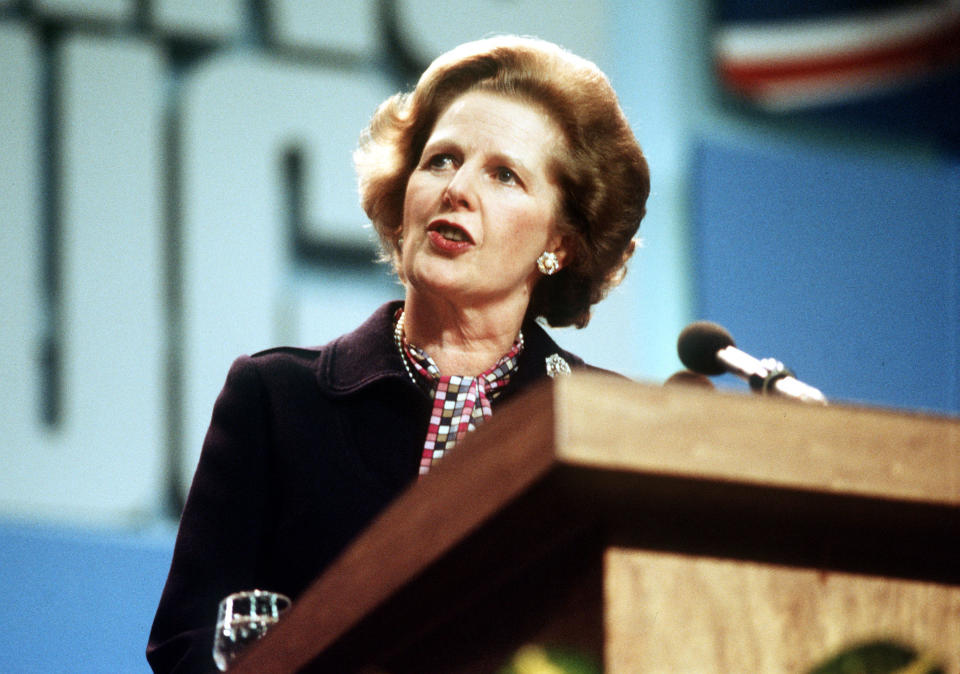Grace Blakeley: Labour needs to take on City as Thatcher took on unions

One of Labour’s leading lights on the critique of capitalism and economic policy has evoked Margaret Thatcher’s ruthlessness in urging the party to confront the City.
In an exclusive interview with Yahoo Finance UK, Grace Blakeley, a former KPMG management consultant, said Labour needed to be as determined to tackle the City as the former Conservative prime minister was to weaken the union movement.
“Labour needs to take on finance in the way that Thatcher took on the unions”, Blakeley said.
She said the time has come for Labour to “use power to shift power” and be prepared to “use the tools of the state” to create a new public banking system, repeal anti-union legislation and fundamentally change the housing market. Such a commitment, she said, was not just right but would also lead to an uptick in Labour’s popularity.
Blakely is an economics commentator and a research fellow at the Institute for Public Policy Research. Her work in IPPR’s “Who cares? The financialisation of social care” was influential in crafting of Labour’s flagship policy on social care, and those in shadow chancellor John McDonnell’s inner circle are keen on her work.
She is also widely tipped for a senior advisory role in a future Labour government under Corbyn.
READ MORE: Boris Johnson’s tax cuts ‘to cost billions and benefit the highest earners most’
Blakeley’s central focus is the governance of corporations. She concedes her proposals are radical. “The 10% cap on ownership [of staff] does not go far enough,” she says of McDonnell’s plan to force companies employing more than 250 people to hand over 10% of shares to employees.
The Labour party reiterated its promise to shake up the corporate world at its recent conference in Brighton. McDonnell announced a series of key measures to ensure the state plays a wider role in day to day economic activity.
The conference was also reassured that Labour would stand by its a manifesto promising the biggest transfer of power from private to state hands by a major party this century.
While McDonnell has many proponents of his wide-ranging reforms, few have the knowledge and debating prowess on capitalism as Blakeley.
In her book, Stolen: How to Save the World from Financialisation, Blakeley cites short-term thinking in corporation as the cause of falling wage and share of national income, and believes that the way to remedy this is to extend concepts of political democracy to corporations.

Blakeley wants to target the way investments are organised currently. She calls for a “People’s asset manager”, saying there are too many degrees of separation between an individual’s pension funds and the funds that they are amalgamated into.
McDonnell’s approach to City hasn’t been described as “sensitive” by many in Westminster, however Blakeley puts it as his eagerness “not to piss off the City”.
READ MORE: UK’s Supreme Court rules prorogation unlawful: what happens next?
“You have to look at how they’re owned”, she says, explaining that railways and utilities are rather straightforward in how they should be nationalised. “But alternative ownership models should be considered for corporations given how influential they are.”
Blakeley also highlights the importance of the Labour movement supporting campaigns around the climate crisis.
“[It] has to be the biggest part of the campaign going forward. The success of [Extinction Rebellion] and the school strikes have shown how it is the biggest issue concerning younger voters ... Labour has to make it a much bigger part of it’s programme,” Blakeley says.
“[The climate crisis] is one of the issues where there is agreement among most parts of the party. The previous divide was social movements versus union movements, however the ‘Green New Deal’ brings the agendas of the social and union movements together, as it means green and growth at the same time.”
READ MORE: Influential think tank proposes Irish backstop solution
Blakeley attributes the recent success of climate activists to the increased focus on class as part of the campaign, which she deems “incredibly important”.
The campaign, she says, has shifted to a wider movement that cares about the class dynamics of climate change. “It is now in line with Marx, which has led to a wider coalition, more likely to call out the root causes of climate change such as the well off taking regular flights and the substantial ecological footprint of corporations.”

 Yahoo Finance
Yahoo Finance 